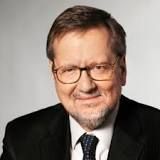From ambition to action: building Europe’s Defence Union
Past event In person

- Area of Expertise
- Peace, Security & Defence

Danish politician, member of the Folketing for the Conservative People's Party from 1984 until 2015, and Minister for the Environment from December 18, 1990 to January 24, 1993
Fyodor Lukyanov, the Russian editor of Russia in Global Affairs, has claimed that “the fight for Ukraine has shown that while the EU has the political will to fight for assets, it is not prepared to pay the price”. This is the Russia’s and its allies’ perception of the West, and the unfortunate truth is that the West is itself to blame for its own image.
We should go back to NATO’s 2008 summit in Bucharest, at which the U.S. tried in vain to bring Ukraine and Georgia closer to the alliance. The U.S. came away from Bucharest with a vague promise for the future, but little else. This indecisiveness within NATO told Russia that it had better frighten the allies now, before it was too late and countries like Georgia and Ukraine were lost to NATO forever. Later that same year, that’s what Russia did in Georgia. There were no serious repercussions after the event, as the new U.S. administration quickly pressed the reset-button. Russia therefore knew that Crimea, too, was there for the taking whenever the situation became ripe.
For Putin it is not a question of money, but a question of strengthening Russia
Why are NATO and the EU unable to do anything? Fundamentally, it comes down to the fact that there is no concrete agreement between the member states, and their different agendas make it difficult to create one. Some member states need Russian energy, others have lucrative contracts with Russia, some don’t want to antagonise Russia for historical reasons and some hope that it will still be possible to integrate Russia fully into Europe.
Nothing serious happened to Russia after its annexation of Crimea. In fact, the EU reacted precisely as Fyodor Lukyanov described; it left Ukraine and Georgia in a ‘grey zone’ which meant that conflict was inevitable. It was not until August of this year that the U.S. and EU got serious and implemented more severe economic sanctions. Their timing means that the West has in reality given up on Crimea, and it is only because Russia has persevered in eastern Ukraine that we in the West have now reacted.
Economic warfare will not change the so-called “Great-Russia” policy of Vladimir Putin. For Putin it is not a question of money, but a question of strengthening Russia. This means that in response the West must have some form of control over Ukraine to prevent Russia becoming a dangerous player on the European continent.
It is important that the EU and NATO should not give up on Ukraine, and still keep the path to our institutions open for an independent Ukraine. And we must show we are serious, which means, that the EU and Ukraine must implement the Association Agreement as quickly as possible so that the EU will give help to Ukraine.
NATO must send Ukraine what it asks for, short of troops. Putting boots on the ground, say in the border-regions of eastern Ukraine, would only give Russia an excuse to move its own military in to save its friends. This may, indeed, be what Russia is waiting for; perhaps the Kremlin is trying to provoke us into doing just that to help them to take control of eastern Ukraine. They may hope to do so either openly or by turning it into a state recognised by Russia as is the case with Abkhaysia and South-Ossetia. Putin is doubtless confident that the stronger of our economic sanctions will not endure for very long.
Therefore the only thing we can do is to stand by our toughest sanctions. If we can do that, it will be a surprise to Russia, which will speed up its pivot to the East and at the same time change its policy towards us in a more constructive and co-operative manner.
Past event In person

Next event

Past event Online

Past event Online





Stay informed
We use cookies and similar technologies to adjust your preferences, analyze traffic and measure the effectiveness of our campaigns. Learn more about our privacy policy.